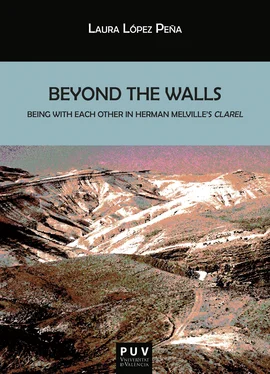Laura López Peña - Beyond the Walls.
Здесь есть возможность читать онлайн «Laura López Peña - Beyond the Walls.» — ознакомительный отрывок электронной книги совершенно бесплатно, а после прочтения отрывка купить полную версию. В некоторых случаях можно слушать аудио, скачать через торрент в формате fb2 и присутствует краткое содержание. Жанр: unrecognised, на английском языке. Описание произведения, (предисловие) а так же отзывы посетителей доступны на портале библиотеки ЛибКат.
- Название:Beyond the Walls.
- Автор:
- Жанр:
- Год:неизвестен
- ISBN:нет данных
- Рейтинг книги:3 / 5. Голосов: 1
-
Избранное:Добавить в избранное
- Отзывы:
-
Ваша оценка:
- 60
- 1
- 2
- 3
- 4
- 5
Beyond the Walls.: краткое содержание, описание и аннотация
Предлагаем к чтению аннотацию, описание, краткое содержание или предисловие (зависит от того, что написал сам автор книги «Beyond the Walls.»). Если вы не нашли необходимую информацию о книге — напишите в комментариях, мы постараемся отыскать её.
Beyond the Walls. — читать онлайн ознакомительный отрывок
Ниже представлен текст книги, разбитый по страницам. Система сохранения места последней прочитанной страницы, позволяет с удобством читать онлайн бесплатно книгу «Beyond the Walls.», без необходимости каждый раз заново искать на чём Вы остановились. Поставьте закладку, и сможете в любой момент перейти на страницу, на которой закончили чтение.
Интервал:
Закладка:
López’s response to Melville’s literary expression embodies the “Humanities” in the way that dramatizes how the engagement of the reader bonds with the text to open the potential of its promise for intersubjective sharing. Helen Vendler, another Harvard professor of poetry, sensitively appraised Clarel as “one of the lasting documents of American culture” which “deserves to be better known”. 9 Beyond the Walls helps us to know Clarel better by providing evidence for Robert Penn Warren’s assessment that Melville’s poem is “a fundamentally necessary document of our human experience”. 10 Both Clarel and Beyond the Walls ultimately express how literature matters and why the humanities communicate lasting significance even through its tragic reminder of the intersubjective potential we fail to manifest.
1 Herman Melville, Moby-Dick , Eds. John Bryant and Haskell Springer (1851; New York: Pearson Longman, 2007), 123.
2 Lawrence Buell, “Melville and the Question of American Decolonization”, American Literature 64 (1992): 230.
3 Robert Penn Warren, “Introduction” to Selected Poems of Herman Melville: A Reader’s Edition (New York: Random House, 1970), 46.
4 Quoted in Selected Poems of Herman Melville. Ed. Hennig Cohen (1964; New York: Fordham University Press, 1991), xii.
5 Alphonso Lingis, The Community of Those Who Have Nothing in Common (Bloomington: Indiana University Press, 1994), 69-106.
6 Herman Melville, “Sketch Eighth: Norfolk Isle and The Chola Widow” from “The Encantadas” in The Piazza Tales and Other Prose Pieces 1839-1860 (Evanston and Chicago: Northwestern University and Newberry Library, 1995), 153.
7 Newton Arvin, Herman Melville (New York: William Sloan Associates, 1950), 276.
8 Herman Melville, Letter to James Billson, 10 October 1884, in Correspondence (Evanston and Chicago: Northwestern University and Newberry Library, 1993), 483.
9 Helen Vendler, “Desert Storm—A Poem and Pilgrimage in the Holy Land”, The New Republic (December 7, 1992): 42.
10 Warren, 12.
Introduction
They were nearly all Islanders in the Pequod, Isolatoes too, I call such, not acknowledging the common continent of men, but each Isolato living on a separate continent of his own.
Herman Melville, Moby-Dick
The present volume claims intersubjective universalism as the ethico-political project articulated in Herman Melville’s 1876 narrative poem Clarel: A Poem and Pilgrimage in the Holy Land . It follows studies on Melville’s global consciousness analyzing the capacity of the author’s works to reflect a democratic understanding of humanity beyond the dividing parameters of nation/ality, ethnicity, social class, religious beliefs, cultural background, gender, and orthodox definitions of sexuality. To name a few, some of these studies are: Grejda’s The Common Continent of Men (1974), Hamilton’s “On ‘Live in the All’ Once Again” (1983), Bryant’s “‘Nowhere a Stranger’” (1984) and “Citizens of a World to Come” (1987), Sten’s “Melville’s Cosmopolitanism” (2001), Marr’s “Without the Pale” (2005), Waugh’s “‘We are not a nation, so much as a world’” (2005), Gibian’s “Cosmopolitanism and Traveling Culture” (2006), Lyons’s “Global Melville” (2006), Kaplan’s “Transnational Melville” (2010), and Obenzinger’s “Herman Melville Returns to Jerusalem” (2010). These excellent examinations of the egalitarian (Grejda), cosmopolitan (Bryant, Gibian, Marr, Sten), transnational (Kaplan), global (Hamilton, Lyons), or globally conscious (Waugh) aspects of Melville’s works have been enabling to this volume’s analysis of Melville’s Clarel as universalist. So have been existing studies exclusively dedicated to the lengthy and complex Clarel , a poem which continues to be one of the most unanalyzed of Melville’s texts despite growing interest in Melville’s poetry recently: Knapp’s Tortured Synthesis (1971), Kenny’s Herman Melville’s Clarel (1973), Short’s “Form as Vision in Herman Melville’s Clarel ” (1979), Hayford, MacDougall, Parker, and Tanselle’s critical study in the Northwestern-Newberry edition of Clarel (1991), Goldman’s Melville’s Protest Theism (1993), Obenzinger’s American Palestine (1999), and Potter’s Melville’s Clarel and the Intersympathy of Creeds (2004). Walter Bezanson’s work on Clarel deserves a separate mention, as it is perhaps the most important foundation to all scholars who have ventured into the poem.
Unlike many of the previous studies, however, this volume moves away from a conception of Melville’s global project as cosmopolitan or internationalist, in that, both cosmopolitanism and internationalism endorse a vision of world community which, despite being grounded on a global affiliation with “the world” and “humanity”, also retains a strong adherence to nationalism and patriotism, on the other hand restrictive of such global feeling. Thus, my critical regard adds to those of scholars who have considered that cosmopolitanism and internationalism continue endorsing a nationalist agenda that does not dismantle but, on the contrary, upholds—in the same way that multiculturalism—the very powerstructures of the nation-state which have recurrently been oppressing to certain groups of citizens and non-citizens, at different times in history, and continue to be so in the present. Martin Heidegger best exposed this paradox when he claimed that “[n]ationalism is not overcome through mere internationalism; it is rather expanded and elevated thereby into a system” (244). In our present day and age, the result of this cosmopolitan/internationalist outlook has consisted of little more than supranational institutions, internationalist in scope but deeply grounded on, and protective of, national interests. These institutions have so far been fruitless in their efforts to grant basic international human rights in face of particular nation-states’ abuse of power and violation of human rights (I write this introduction as a new military incursion into Gaza is being carried out by Israeli military forces, who have already killed over 600 Palestinians in less than a week, the majority of them civilians, while the UN and the rest of the world remain impassive, and while not even borders have been opened to allow refugees out of Gaza). In front of this present situation, it is important to turn to Herman Melville’s work. Living and writing in a large part of the nineteenth century (he was born in 1819 and died in 1891), a period of growing nationalisms, “nation” and “nationhood” construction, and of the sovereignty of the nation-state, 1 Melville was critical of nationalisms and even exposed a global consciousness transcending cosmopolitanism or internationalism. This consciousness is already present in early novels such as Mardi (1849): “Take all Mardi for thy home. Nations are but names; and continents but shifting sands” (1300). Melville’s critical regard for cosmopolitanism is most evident in his last published novel The Confidence-Man (1857). This global consciousness, in my view beyond cosmopolitanism and internationalism, is constant in Melville’s oeuvre, including his late poetry, which transcends notions of identitarian and/or communitarian, even nationalist, parameters often undermining the very global claims both cosmopolitanism and internationalism profess.
This study aims to demonstrate that the 17,863 line-long 2 Clarel articulates a universalist project that breaks through the inter-human walls (im)posed both by individualism and by traditional forms of communitarianism based on rigid conceptions of identity (e.g. nation-state, ethnicity, culture, class, religious affiliation, gender, sexuality) which enforce one-sided thinking and monologic views of the world. In a special way, it analyzes the ethical and political potentiality of intersubjectivity to abridge (or not) inter-personal separation and develop (or not) more democratic human relationships. Recurrently, Melville placed the possibility or impossibility of universalism in the possibility or impossibility of intersubjectivity, yet, far from falling into an idealism which the author himself criticized as naïve in some of the characters he created, Melville’s exploration was permanently torn between the democratizing potentiality the author located in interpersonal relationships, and the bleak realization that human beings might never materialize such democratic project. The thesis of this study, thus, is that Clarel is a universalist poem which investigates not only the necessity and potentialities, but also, and most importantly, the challenges, difficulties, and obstacles preventing the actual development of intersubjectivity and, consequently, of universalism. In this respect, I claim that Clarel gives continuity to Melville’s recurrent exploration throughout his literary production of the possibility and the impossibility of democratic human relationships, and of the dangers, beauties, and interconnection of intersubjectivity, universalism, and democracy.
Читать дальшеИнтервал:
Закладка:
Похожие книги на «Beyond the Walls.»
Представляем Вашему вниманию похожие книги на «Beyond the Walls.» списком для выбора. Мы отобрали схожую по названию и смыслу литературу в надежде предоставить читателям больше вариантов отыскать новые, интересные, ещё непрочитанные произведения.
Обсуждение, отзывы о книге «Beyond the Walls.» и просто собственные мнения читателей. Оставьте ваши комментарии, напишите, что Вы думаете о произведении, его смысле или главных героях. Укажите что конкретно понравилось, а что нет, и почему Вы так считаете.










